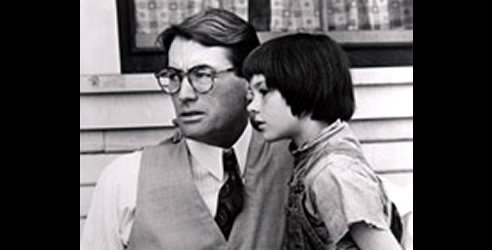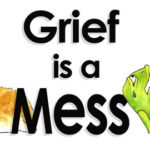
Photo: TCM Film Article
The debate over Harper Lee’s recently published Go Set a Watchman novel continues. HarperCollins reports it is the fastest selling book in their company’s history, yet one bookstore has said it will accept refunds from buyer’s who agree the unedited manuscript should never have been published.
For those who are not informed because they had better things to do: Quick Synopsis of Mockingbird and Watchman
If you haven’t followed the literary debate, Harper Lee is the author of the classic To Kill a Mockingbird, published in 1960. The book later became an award-winning movie starring Gregory Peck as Atticus, a rural Southern lawyer who defends a black man against unjust charges of rape.
Atticus’s daughter, Scout, is nine years old in Mockingbird, and lives through vicious attacks on the family because of her father’s decision to defend the black man. Watchman opens with a 26 year old Scout taking a train south to visit Atticus, now 72 years old. Much to her surprise, Scout soon learns her father has always been a bigot. The revelation shatters her image of her father and the book moves on from there.
The loss of respect for Harper Lee and her wishes
The first level of debate over the 60 year old manuscript started in February of this year. Was it an unedited first draft or a sequel to To Kill a Mockingbird? And why did Harper Lee give permission for it to be published? None of the questions are likely to be resolved by Harper Lee.
Lee is an 89 years old woman who has suffered a stroke and is blind and deaf. She lives in assisted living. And when healthy she never wavered: she refused to publish another book! Those who know Lee doubt she is even aware of the press release written over her signature. Newsweek’s headline was “Friends Say Harper Lee Was Manipulated.”
Suffice to say “follow the money” and you will find out just how Go Set a Watchman came to your local bookstore.
(This betrayal reminds me of a similar circumstance: Mother Teresa’s wrote about the absence of any sense of God in the final 50 years of her life. The letters were understood to be confidential, and she requested they be destroyed. The Catholic Church ignored her wishes and decided the letters belonged to them, and not Mother Teresa – thus the book Mother Teresa: Come Be My Light: the Private Writings of the Saint of Calcutta was published.)
Will the real Atticus please stand up!
If the debate had not shifted to whether Atticus was really the Mockingbird hero or the Watchman bigot, I would not have one day blurted out “Why can’t Atticus be a hero and a bigot?”
Within minutes memories of my family’s relationship with race surfaced.
The only living creatures of color in my hometown were the crows
No Blacks lived in my hometown.
My family said a black family moved into town one afternoon, and a group of men visited after sundown urging them to leave by morning. And they did. I wouldn’t surprise me if money changed hands. Bryan was a wonderful white utopia that somehow managed to accept one Hispanic family. But the upshot was we were white and we were going to stay white.
The 1950’s Minstrels
I was not yet in elementary school when I started going to the annual minstrel shows held in the high school auditorium. My mother and other school teachers sang, danced and told jokes in blackface. The all-white community laughed uproariously as the ever-amiable blackfaced characters entertained them with scripted dimwitted illiterate slave conversation.
The 1960’s Black Movement
My mother left her blackface behind and started listening to the real thing: Martin Luther King. She was certain the US would come apart if we didn’t grant equal rights to blacks. While she supported revolution she feared rebellion. That said she also believed the government couldn’t hand money to someone who had never had it before and expect them to know what to do with it. Education, she felt, was key to it all.
One afternoon in 1963 she came home from school upset. She had asked the superintendent to get a sub so she could join Martin Luther King in Birmingham. The superintendent “strongly discouraged” the trip and refused to call for a substitute teacher.
The 1970’s end of red-lining
The phone rang and it was my mother. (She had retired and was living with my dad in Arizona.)
She said the man across the street was selling his house. As she talked, I had a hard time following why she cared until she said “He has sold it to a black family!” My response was “So?” What followed was her scattered attempt to tell me exactly why this was terrible. And why my parents were listing their home for sale the next week.
I couldn’t resist. I simply couldn’t. I had to say it: “Is this the woman who talked to me about equal rights/equal opportunity? Is this the woman who wanted to go to Birmingham with Martin Luther King?”
There was silence. And then came her truth: “This is about money! This is about our house losing half its value. We can’t afford that! Who knows what this family is like? Who knows how well they will care for the property? And once one family moves in there is sure to be more.”
I tried, unsuccessfully, to calm her down, and as I ended the conversation I said, “Don’t expect me to help you pack.”
The loss of illusion
Was my mother both a warm-hearted humanitarian, and a practical bigot? Yes. She was in survival mode. The house and their slim savings were basic needs, and the greater good was out the window.
My parents’ fear that property values could drop was real. Red-lining had recently become illegal, and people were wildly overreacting.
Epilogue
The week after my mother’s call, a moving van pulled up in front of the house across the street. Then a car driven by a white man with two white female passengers drove into the driveway.
The blacks? There were no blacks. The seller said he thought it would be fun to create a bit of neighborhood drama.
Needless to say my folks removed the “for sale” sign, and we never spoke of it again.
Why Care?
The bigoted side of Atticus in Watchman and my mother’s change-of-heart give both individuals realistic dimension. Both stories force us to admit, accept and tolerate the bigoted part of ourselves that co-exists with the better ones.
What we shouldn’t accept and tolerate in ourselves, however, is indifference.






























